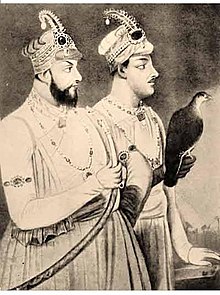
Back مير جعفر Arabic মীর জাফর আলী খান Bengali/Bangla Mir Jafar Catalan Mir Jafar German نواب میر جعفر Persian Mir Jafar French मीर जाफ़र Hindi ミール・ジャアファル Japanese മിർ ജാഫർ Malayalam Mir Jafar Dutch
| Mir Syed Jafar Ali Khan Bahadur | |||||
|---|---|---|---|---|---|
 Mir Jafar (left) and his eldest son, Mir Miran (right). | |||||
| Nawab Nazim of Bengal and Bihar | |||||
| 1st reign | 2 July 1757 – 20 October 1760 | ||||
| Predecessor | Siraj ud-Daulah | ||||
| Successor | Mir Qasim | ||||
| 2nd reign | 25 July 1763 – 5 February 1765 | ||||
| Predecessor | Mir Qasim | ||||
| Successor | Najimuddin Ali Khan | ||||
| Born | 1691 Delhi, Delhi Subah, Mughal Empire | ||||
| Died | 5 February 1765 (aged 73–74) Namak Haram Deorhi, Bengal, British India | ||||
| Burial | Jafarganj Cemetery, West Bengal, India | ||||
| Spouse | Shah Khanum (m. 1727, d. August 1779) Munni Begum (m. 1746, d. 10 January 1813) Rahat-un-nisa Begum (Mut'ah wife) Babbu Begum (d. 1809) | ||||
| Issue |
| ||||
| |||||
| House | Najafi | ||||
| Father | Syed Ahmed Najafi (Mirza Mirak) | ||||
| Religion | Shia Islam[1][2][3] | ||||
Mir Jafar[a] (c. 1691 – 5 February 1765), was a commander-in-chief or military general who reigned as the first dependent Nawab of Bengal of the British East India Company. His reign has been considered by many historians as the start of the expansion of British control of the Indian subcontinent in Indian history and a key step in the eventual British domination of vast areas of pre-partition India. He is best known for his betrayal of Nawab Siraj-ud-daulah (Nawab of Bengal, Murshidabad, Bengal, now West Bengal) in the Battle of Plassey (Nadia district, Bengal, now West Bengal).
Mir Jafar served as the commander of the Bengali army under Siraj ud-Daulah, but betrayed him during the Battle of Plassey and ascended to the masnad after the British victory in 1757. Mir Jafar received military support from the East India Company until 1760, when he failed to satisfy various British demands. In 1758, Robert Clive discovered that Jafar had made a treaty with the Dutch East India Company at Chinsurah through his agent Khoja Wajid. Dutch ships of the line were also seen in the River Hooghly. Jafar's dispute with the British eventually led to the Battle of Chinsurah. British company official Henry Vansittart proposed that since Jafar was unable to cope with the difficulties, Mir Qasim, Jafar's son-in-law, should act as Deputy Subahdar. In October 1760, the company forced him to abdicate in favor of Qasim. However, the East India Company eventually overthrew Qasim as well due to disputes over trade policies. Jafar was restored as the Nawab in 1763 with the support of the company. Mir Qasim, however, refused to accept this and went to war against the company. Jafar ruled until his death on 5 February 1765 and lies buried at the Jafarganj Cemetery in Murshidabad, West Bengal.
Due to his role in helping the British colonize India, and the eventual downfall of the Mughal Empire, Mir Jafar is reviled in the Indian subcontinent as a traitor, especially among the Bengalis in both India and Bangladesh.
- ^ S. A. A. Rizvi, A Socio-Intellectual History of Isna Ashari Shi'is in India, Vol. 2, pp. 45–47, Mar'ifat Publishing House, Canberra (1986).
- ^ K. K. Datta, Ali Vardi and His Times, ch. 4, University of Calcutta Press, (1939)
- ^ Andreas Rieck, The Shias of Pakistan, p. 3, Oxford University Press, (2015).
Cite error: There are <ref group=lower-alpha> tags or {{efn}} templates on this page, but the references will not show without a {{reflist|group=lower-alpha}} template or {{notelist}} template (see the help page).